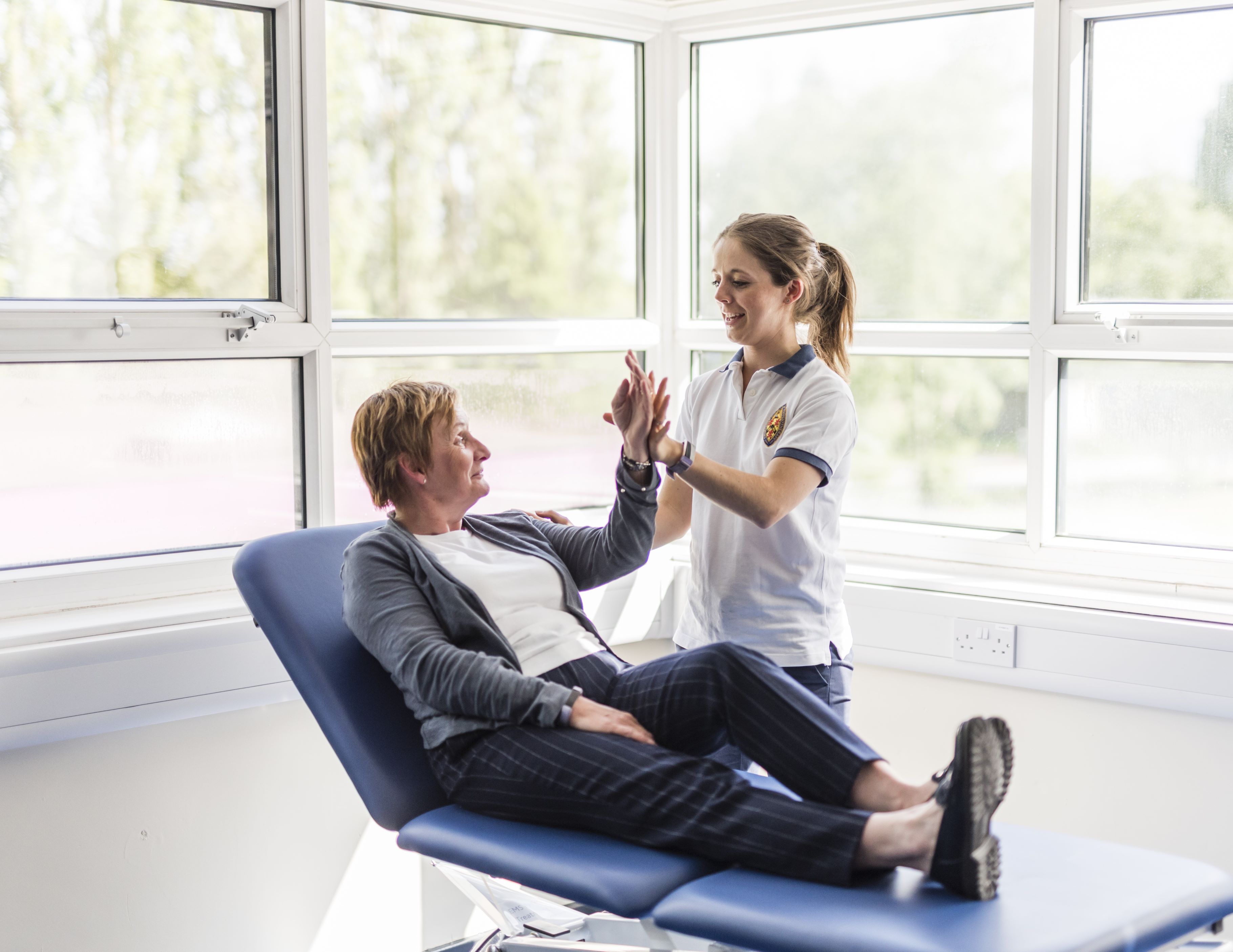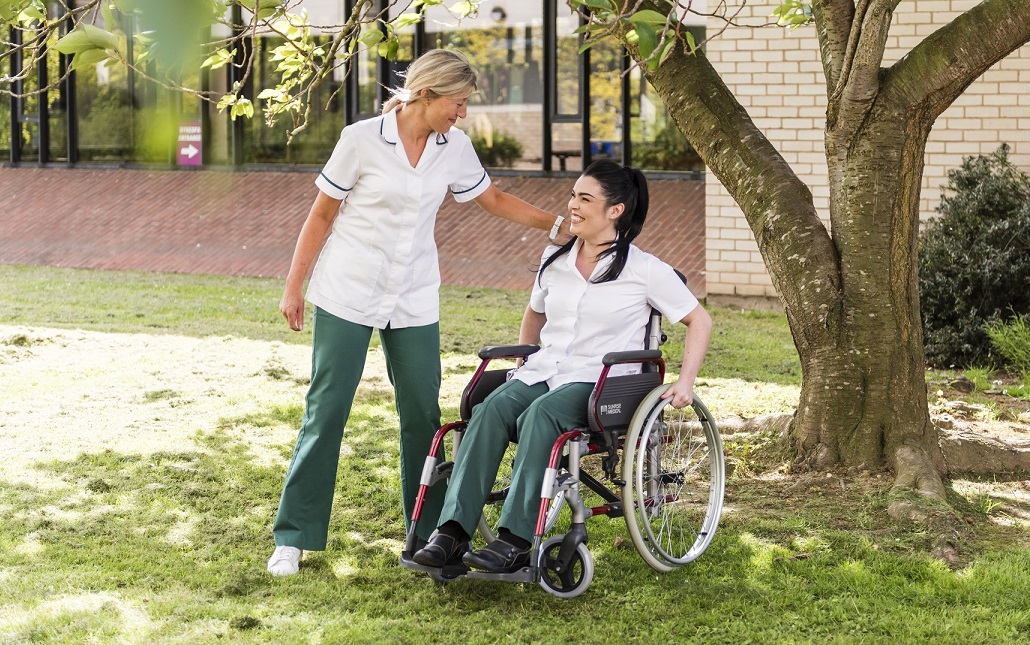BSc (Hons) Physiotherapy

Course details
UCAS Code
PT19
Year of entry
2025
Duration
3 YRS (FT)
UCAS Tariff
120
Institution Code
G53
Location
Wrexham
Course Highlights
1st in the UK
for Student Experience*
Accredited
by the Chartered Society of Physiotherapy
Joint 1st in UK
for Graduate Prospects*

Physiotherapy atWrexham University
Thinking of a career in Physiotherapy? Hear from lecturers and students about our degree at Wrexham University.
Why choose this course?
This course equips you with the knowledge and skills required by physiotherapists to work with people to identify and maximise their ability to move and function, work with people to promote, maintain and restore physical, social and psychological wellbeing, and assess and manage people who have a variety of clinical problems.
You will:
- Be taught by skilled staff who are all registered Physiotherapists with specialist clinical interests
- Access joint teaching sessions with Allied Health professional students
- Be eligible to apply for initial registration with the Health and Care Professions Council (HCPC) and for full membership of the Chartered Society of Physiotherapy (CSP). Student membership of the CSP is self-funded.
- Have opportunities to attend placement across North Wales and Powys. Some placements will be over 60 minutes’ drive and therefore you will get the opportunity to reside close to your placement setting.
- Develop excellent communication and problem-solving skills
- Develop professionally and personally over the course of study, benefiting from a combination of academic study and 1000 clinical hours on placement
*This course is part of a subject area ranked
- 1st in Wales and top 10 in the UK for Teaching Quality
- 1st in the UK for Student Experience
- Joint 1st in the UK for Graduate Prospects
in the Subjects Allied to Medicine subject area league table in the Times and Sunday Times Good University Guide, 2025
*This course is part of a subject area ranked:
- 2nd in the UK for Academic Support
- Top 3 in the UK for Organisation and Management
- Top 10 in the UK for Assessment and Feedback
- Top 5 out of Wales, Scotland, and Northern Ireland for Overall Satisfaction
in the National Student Survey, 2024


Key course features
- Health and Care Professions Council approved.
- Accredited by the Chartered Society of Physiotherapy.
- 1000 hours of placement provided by the University.
- Simulation activities using the simulation facilities including the simulation house.
- A wide range of authentic assessment methods including VIVA and OSCE.
- Small class sizes, ensuring you receive personalised attention and support.
- This course allows you to work interprofessional, collaborating with students learning Occupational Therapy, Speech and Language Therapy, Operating Department Practice, Nutrition and Dietetics and Paramedic Science.
What you will study
YEAR 1 (LEVEL 4)
This year provides a grounding in the basic assessment of a patient across core areas in which physiotherapists work. It includes an introduction to professionalism, communication, clinical practice in the form of a placement and research. You will be learning along side Occupational Therapy, Paramedic Science and Operating Department Practice Students.
MODULES
- Building Physiotherapy Practice 1: This module lays the foundations of musculoskeletal assessment and clinical reasoning using case scenarios and a ‘whole-person’, patient centered approach.
- Foundations in Research: This module is taught as an interprofessional (IPE) module where the basics of critical appraisal of literature and academic writing are developed.
- Building Physiotherapy Practice 2 and Placement 1: This module lays the foundations of neurological physiotherapy assessment along with public health using case study scenarios to apply to clinical practice. This module also includes a 4-week placement.
- Foundations of Professional Practice: This module is taught as an IPE module where Professional standards and values are discussed and explored in preparation for clinical placement.
YEAR 2 (LEVEL 5)
This year builds upon knowledge and understanding in Level 4 to move towards management in core areas of physiotherapy including complex conditions and the development of evidence in practice.
MODULES
- Evidence in Practice: This module is taught as an IPE module where you apply your knowledge of the research process to create a research study proposal that will be carried out at Level 6.
- Care of People with Complex Conditions: This module draws together a range of specialist conditions and complex conditions in new contexts and environments that the student will encounter in practice and will equip the you with the skills necessary to critically evaluate conditions they may not have practically encountered previously.
- Developing Cardiorespiratory Physiotherapy Practice: This module builds upon basic knowledge of cardiorespiratory practice to further enhance assessment and management of patients with MSK conditions.
- Developing Musculoskeletal Physiotherapy Practice: This module builds upon basic knowledge of musculoskeletal practice to further enhance assessment and management of patients with MSK conditions.
- Developing Neurological Physiotherapy Practice: This module builds upon basic knowledge of neurological practice to further enhance assessment and management of patients with MSK conditions.
- Professional Placement 2: This 7-week placement aims to develop your skills in clinical practice whilst on placement. The placement is marked on a CSP created scoring system.
YEAR 3 (LEVEL 6)
This year culminates in a dissertation research project alongside applying knowledge in two large clinical placements and a transition to practice module.
MODULES
- Research for Practice: This module is the application of the Level 5 research proposal; a dissertation written in journal publication format in combination with a reflective piece.
- Professional Placement 3: This 6-week placement aims to develop your skills in clinical practice whilst on placement. The placement is marked on a CSP created scoring system.
- Professional Placement 4: This 10-week placement aims to develop your skills in clinical practice whilst on placement. The placement is marked on a CSP created scoring system.
- Transition into Professional Practice: This module will provide health care students with the necessary skills and knowledge of how to improve, reflect on the way they and the teams in which they work and deliver services; allowing innovation and transformation at every stage of their career. This is an IPE module.
The information listed in this section is an overview of the academic content of the programme that will take the form of either core or option modules. Modules are designated as core or option in accordance with professional body requirements and internal academic framework review, so may be subject to change.
Entry requirements & applying
Note: Applications for 2025/26 are now closed.
Entry requirements:
The academic requirements for the course are 120 UCAS tariff points at GCE A-level with a minimum of grade B in Biological Science or Physical Education.
Qualifications equivalent to A Level will be taken into account, including (for example) 120 UCAS tariff points from an Access to HE Diploma or level 3 BTECs (Science or Health Studies).
We will expect applicants to normally have achieved a minimum of 5 GCSE passes (A*-C, or 9-4) to include Maths, Biological Science and English/Welsh (First Language).
Applications are considered individually and on merit, however, you must have:
- Recent (last 5 years) A Level or equivalent study.
- 120 UCAS tariff points (if you are a school leaver. Other qualifications that do not carry UCAS points can be taken into account for mature applicants).
- Experience of a health/social care/third sector settings whether in a voluntary or paid role.
- Attendance at Wrexham University Open Day or Physiotherapy taster session.
All post interview offers of a place on this degree will be conditional on a satisfactory Disclosure and Barring Service (DBS) check. In addition, any acceptance onto the course is subject to Occupational Health Clearance.
Teaching & Assessment
The Physiotherapy degree is a full-time course (5 days a week needed for a combination of independent learning and lecturer-led sessions) and it is expected that you attend all sessions and complete all pre and post sessional preparation work and self-directed study. To ensure success on this programme of study, you will need to fully engage in the pre and post session preparation work. This allows you to gain the most possible from face-to-face teaching.
Assessment is varied and is undertaken in the form of written academic work, practical objective structured clinical examinations (OSCE), placement pass/fail and VIVA – verbal examinations. Practical assessments will take the form of case studies with models where you will demonstrate assessment and treatment skills along side demonstrating your theoretical knowledge.
Teaching and learning
We offer workshops and support sessions in areas such as academic writing, effective note-making and preparing for assignments.
Students can book appointments with academic skills tutors dedicated to helping deal with the practicalities of university work. Our student support section has more information on the help available.
In terms of particular needs, the University’s Inclusion Services can provide appropriate guidance and support should any students require reasonable adjustments to be made because of a recognised prevailing disability, medical condition, or specific learning difference.
Career prospects
Our dedicated Careers and Employability team is committed to helping you achieve your professional goals. They provide personalised advice, useful resources, and extracurricular employability events to prepare you for the job market.
Graduates of this course will be expected to fulfil the terms and conditions of the bursary if they have opted as they have a commitment to work in Wales for two years following graduation. Following that, physiotherapists may work in a range of settings including:
- NHS
- Social care
- Private practice
- Charites
- Sports teams and clubs
Additionally, you may choose to further your expertise through postgraduate studies. Explore our postgraduate courses for more information.
Fees & funding
You do not have to pay your tuition fees upfront.
The fees you pay and the support available will depend on a number of different factors. Full information can be found on our fees & finance pages. You will also find information about what your fees include in the fee FAQs.
All fees are subject to any changes in government policy, view our undergraduate fees.
Programme specification
You can see the full programme specification here.Accommodation
At Wrexham University, we offer on-campus en-suite rooms within our Wrexham Student Village. These private, fully furnished spaces are conveniently located, providing easy access to campus facilities, study areas, and social spaces. Plus, you’re just a 10-minute walk from the city centre!
With all bills included, free Wi-Fi, 24/7 security, and large social areas, you’ll find everything you need for a great student experience.
Explore our student accommodation options to find your perfect home away from home.

